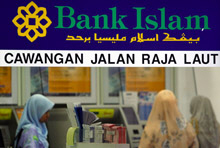
Typical street scene in Santa Ana, El Salvador. (Photo: iStock)
IMF Survey: Malaysia: An Islamic Capital Market Hub
September 18, 2007
- Malaysia accounts for about two-thirds of global Islamic bonds (
- sukuk
- ) outstanding
- Shariah
- -compliant stocks comprise about 86 percent of domestic stock exchange
- Authorities had key role in developing Malaysia's Islamic capital market
Malaysia is a champion for the development of capital market-based instruments under Islamic law in the form of sukuk.

Bank in Kuala Lumpur, Malaysia—where authorities have issued guidelines for Islamic securities (photo: Bazuki Muhammad/Reuters)
ISLAMIC FINANCE
It hosts the world's largest Islamic bond market, estimated at $47 billion.
Malaysian Islamic capital markets (ICM) have been developing at a rapid pace since the 1980s. The country now accounts for about two-thirds of the global Islamic bonds (sukuk) outstanding and represents the largest sukuk market in terms of outstanding size and number of issues.
While sukuk account for 14 percent of Malaysian public sector bonds outstanding, they represent about half of the total stock of corporate bonds outstanding ($32 billion). Corporate sukuk are issued mainly by the infrastructure/utilities and property/real estate sectors (70 percent).
The most common type (around 80 percent) of corporate sukuk are based on bai bithaman ajil (a sales contract where payment is made in installments after delivery of goods) and murabahah (synthetic loans/purchase orders). Shariah-compliant stocks account for about 86 percent of stocks listed in the domestic stock exchange and 65 percent of total market capitalization ($195 billion).
Supportive role
The Malaysian authorities have played a key role in the development of the ICM, including through the issuance of local and global benchmark Islamic instruments. The growth in size and scope of the Malaysian ICM has also been accompanied by changes in the institutional and regulatory framework, as well as the market infrastructure and tax framework. These developments have helped deepen the domestic capital markets and provide financing to the domestic private and public sector.
Recent policy initiatives aim now at leveraging existing achievements in the domestic capital markets to strengthen Malaysia's position as a global ICM hub. In 2000, the 10-year Capital Market Master Plan provided the broad strategic position and future direction for the ICM market. The authorities also issued guidelines for Islamic securities.
Global hub
The Ninth Malaysia Plan, covering 2006-10, seeks to position Malaysia as a global hub for ICM products and services and, in particular, as a center for origination, distribution, trading, fund, and wealth management. And, the Malaysia International Islamic Financial Centre is being established as a one-stop contact point to facilitate the issuance of sukuk.
In addition, the authorities have introduced a number of initiatives and measures to further open their Islamic markets, including supporting the entry of foreign intermediaries, more flexible exchange control policies, a facilitative tax regime, and more flexible immigration policies.
More broadly, the authorities also aim at an increased role for Islamic finance in the domestic intermediation process. For instance, the Ninth Malaysia Plan allocates 200 billion Malaysian ringgit for developmental projects and 20 billion for private finance initiatives. Malaysia will also ease rules to allow banks to conduct Islamic banking business in foreign currencies.


